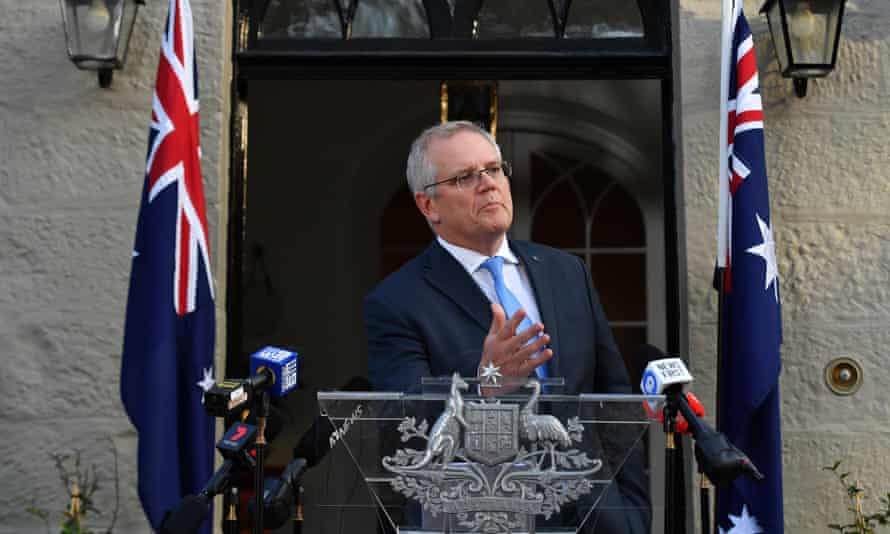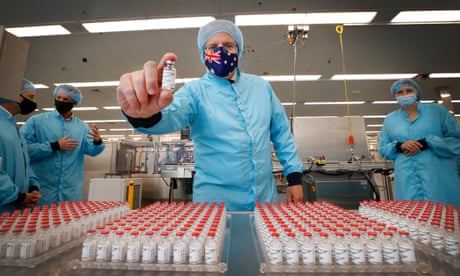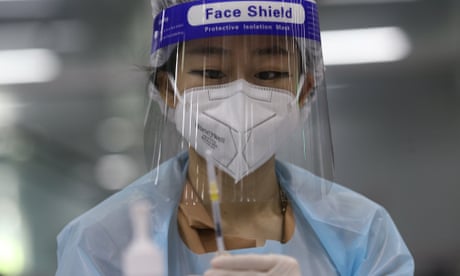Extract from The Guardian
In the past week, when the country was looking desperately for some leadership, Scott Morrison shrank to the occasion

Last modified on Sat 17 Jul 2021 06.02 AEST
Australians are, once more, being hit with that sinking feeling.
With Sydney and Melbourne in lockdown and the rest of the country on edge, people are looking ahead with fear and trepidation: births without grandparents, deaths without farewells, fewer hugs and less joy. For many, they look ahead and see crippling isolation.
Under siege from the Delta variant, fortress Australia is collapsing.
Despite being told the country’s zero-Covid strategy with hard borders and snap lockdowns was the best strategy in the world for dealing with the virus, it turns out we were sold a pup. The fortress was a house of cards.

Whichever way you dice it, the country is staring down the barrel of catastrophe. If the lockdowns work, the country still has months of uncertainty and lockdowns ahead of it while the vaccine stroll-out continues. If they don’t, the picture is even more terrifying. One only needs to look at the number of cases in intensive care in Sydney today for a taste of what could yet unfold.
And while the zero-Covid strategy worked well at preventing deaths in Australia in 2020 while the world was scrambling to develop a vaccine, the path back to normal this year has been hamstrung by a collection of policy failures and political decisions that could bring down the Morrison government.
Which brings us to the inevitable need to talk about Kevin.
Forgive me for being cynical for a sec about the “Kevin our saviour” incident, in which information about Kevin Rudd being engaged by frustrated businessmen to contact the global head of Pfizer, Albert Bourla, was dutifully leaked to the ABC.
While it’s doubtful that Rudd sucking up to the global chief of Pfizer played a huge part in the Australian government being able to bring forward some vaccine doses (more light shower than flood), the timing suggested he may have helped.
It certainly did no harm, and hell, surely it was worth a try.
Guess who hadn’t tried? Morrison, who was able to make at least 55 phone calls in support of his colleague Mathias Cormann becoming the OECD’s secretary general, but not a single call to Bourla. The eyebrows of the ABC’s Laura Tingle said it all.
Putting aside for a moment the serious ethical question of whether Australia should be able to get vaccines fast-tracked when other needier countries are fighting for limited global supplies, the Rudd intervention touched a nerve.
Hunt “had a little chuckle” when he read the story, while Dutton felt the need to respond with a cry-laugh emoji when Pfizer released a statement on the talks.
Really fellas? Four million people have died from Covid and you think it’s a bit of a laff that a former prime minister tried to help firm up Australia’s woeful vaccine supplies that might actually save some lives.
The simple act of Rudd making a phone call, where Morrison had not, exposed the yawning vacuum of leadership that Australians sense is at the top.
Unlike Hunt and Dutton, Australians are not laughing. Quite frankly, they are terrified. They are scared of dying horrific, preventable deaths that could be avoided if the country had secured adequate vaccine supplies. They dread endless lockdowns.
So it was less than helpful when the government decided to further frighten the country by releasing an advertisement aimed at addressing vaccine complacency.
A bit arrogant, you might think, for the government to suggest vaccine hesitancy is the nation’s biggest problem right now when Pfizer doses remain limited and the under-40s are not even eligible to get the vaccine recommended by the health experts which the government told them to go out and get.
This is not to say vaccine hesitancy is not a concern, but again, the government’s handling of its national pandemic response is in large part to blame.
The decisions of Atagi in this regard are most definitely worth scrutinising. Every time the Australian Technical Advisory Group on Immunisation shifted its advice on the AstraZeneca vaccine, the government faced a setback.
Every change feeds uncertainty, which further fuels vaccine hesitancy.
These scientific deliberations are not easy, and the group has been forced to respond to new evidence and conditions on the ground in real time. But the unfortunate effect has been the unfair demonisation of AstraZeneca, which is a remarkably good vaccine that carries with it a hit-by-lightning level of fatality risk. Australians have become vaccine snobs.
Morrison’s frustration with Atagi is palpable, which is why he decided to lay the blame for the vaccine rollout squarely at their feet this week, saying their “very cautious” decisions had set back the country’s vaccination plan.
But the Atagi advice was just that, advice. Atagi does not run the country.

As the Atagi co-chair, Prof Allen Cheng, told my colleague Paul Karp, “they (the government) make decisions, they run the program, we provide advice”.
Morrison seemed incredulous on Thursday when challenged about whether he could have overruled the Atagi advice. But he also made clear that he had not agreed with the assumption the panel had made at the time that Covid cases in Australia would remain low.
If Morrison and national cabinet had decided it was a better option to push ahead as planned with AstraZeneca – the world’s most relied upon vaccine – most Australians would have received a vaccine by now.
Better yet, if Australia had better diversified its vaccine supplies at the outset – as many experts were urging at the time – it wouldn’t matter what Atagi had said about AstraZeneca and the country would not be where it is now – with just 12.5% of the population fully vaccinated.
When asked if he would have done anything differently for Australia’s vaccination program if he had his time again, Morrison could not bring himself to acknowledge any failure on the government’s part. Not a single government misstep.
“It’s interesting to be wise in hindsight,” Morrison told the ABC’s Sabra Lane. “We would have foreseen the future better.”
Except we could see the future – we were watching it unfold in other countries all over the world.
The lack of self-reflection is staggering.
Morrison has been at pains to stress that Australia has been a victim of its own success in preventing widespread Covid deaths. All Australians – especially Morrison – will be hoping we don’t also become the victims of our failures.
No comments:
Post a Comment